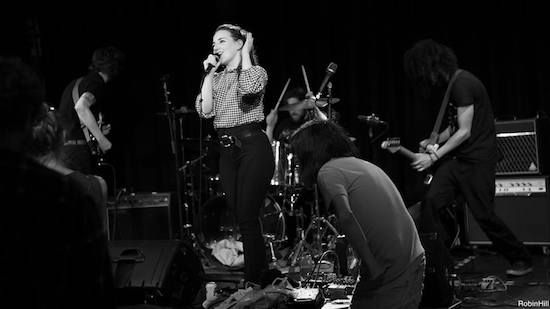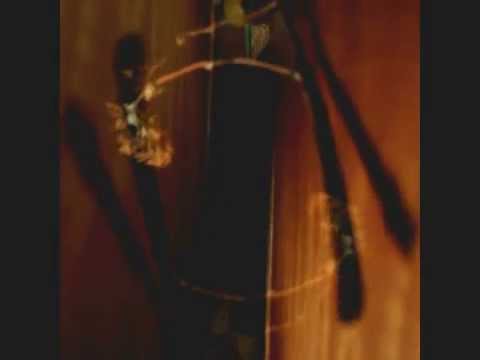“Most the experimental musicians in Manchester have been in either Gnod or Locean”, the bassist, David McLean, of the latter tells me. Locean are a psychedelic collective that, since 2012, have existed with a revolving cast. They tap into a singular, powerful sound. The group are a truly elemental force – and whilst their tenure as a band has seen has seen collaborations with the likes of Gnod and Luminous Bodies – at the eye of the storm are guitarist Jay Temple and vocalist Lauren Bolger. One-part Teenage Jesus, one-part Birthday Party and two-parts Spacemen 3, Locean’s music creates a world wherein time crawls at a snail’s pace but the ground shakes with a volcanic intensity.
Almost entirely improvised, their compositions are sprawling beasts that combine splintering, growling guitars with Bolger’s unique musical presence. Her stream-of-consciousness spoken-word lyrics turn to animalistic screams in a heartbeat, intertwining with beastly, swelling guitar drones and often militaristic percussion. Put simply, Bolger is a poet whose words don’t just rest easy on the page, but also materialise amongst gnostic space jams and kraut-rock meltdowns.
Totally intuitive, Locean’s music is somewhat of an exorcism, their releases since their 2014 self-titled debut album have acted as snapshots of sacred rituals. As is the nature of improvisations, tracks like ‘[When I Was Saved]’ and ‘[Disco?]’ wind and climb through a phantasmagorical spectrum of sounds and rhythms; there’s moments of sparse scatterbrained confusion, moments of pastoral beauty, and moments when their music becomes a fully-fledged krautrock battlecry.
Ahead of their slot at this year’s Raw Power festival, we caught up with Lauren Bolger (vocals) and David McLean (bass) to discuss what makes the band tick.
Can you tell me about how you came to have the current incarnation of the band?
Lauren Bolger: Locean began as me and Jay – who is still in the band now – and some other members at that time. We’ve had quite a lot of different members from the band come and go for a number of different reasons. The band itself is completely improvised, so it allows for that to happen because we don’t have set songs, or any structure other than, “We’re going to improvise now.”
David McLean: I’ve been a spectator of Locean for much longer than I’ve been a member. From my perspective they’ve always been a group of like-minded musicians who would have – at each gig – different presences from the Manchester experimental music scene come in and guest with them at certain performances. Jay and Lauren have always been the two consistent members of the group, and therefore there’s always been a consistent sound with Locean. They’ve always been dirgey, and almost motorik and throbbing. That was always present when they had people from Luminous Bodies or Neil [Francis] and Chris [Haslam] from Gnod with them. There’s always been this big maelstrom of sound.
All of Locean’s music is improvised. What about the lyrics and the vocals?
LB: I’m a poet, and writing poetry is the first art form I ever turned to. I take poetry quite seriously. When it comes to being in the band – because I write a lot in my head as well as on the page – I have lines in my head which come out when I hear certain sounds. I’d say most of it is spontaneous, and a little of it is pre-prepared. The order for the lines is never the same.
As an outsider looking in, there’s quite a healthy experimental scene going on in Manchester right now.
LB: I’ve lived here my whole life, and I’ve been involved with playing music in Manchester since I was twenty, and I’m thirty now – so ten years. There’s lots of little groups of people doing interesting things. The musicians affiliated with Hotspur Press and Islington Mill are inspirational. Both are old mills, which on entry feel like your walking into a derelict building.
DM: We’re also involved in promoting our own shows, so what you have in the city is a range of really good venues that you can hire out for free, and what you have in different spots in the city are a conglomerate of bands that are working in the city out of the same venues. A lot of different pockets of sound are dotted around the city. I promote a lot of avant-garde jazz, but the next night in the same venue, you could have, say – a gothic electro band.
In Manchester, there’s a lot of nights curated to certain sounds, but there’s also promoters who mix things up a bit. Lauren does a night called Paradox; it’s paradoxical. She’ll have a harsh noise musician, and then an improvising solo saxophone. And that was just one show last year.
LB: Manchester has this flatness, but it’s also got this sparkle.
DM: That’s why your night’s called Paradox…
The most recent few tracks of your releases were recorded at The Star and Garter. Can you tell me a bit about the place?
LB: The most notable thing about The Star and Garter is that Manchester Piccadilly train station is quite close by. I could see the train moving as I was doing my recordings, so that brought a sense of starting and stopping. I really love the sound of moving transport, and I have a strange connection with being on a train and writing poetry. I travel on the train to university, so I always use that time to write, writing to the noise in the background. Having noise around me when I’m writing is something I find really stimulating. We’re never really living in silence, there’s always some sound going on, and I feel like I’m very sensitive to that.
My favourite track of yours is ‘[When I Was Saved]’. Can you tell me a little bit about it.
LB: ‘[When I Was Saved]’ was part of the Star and Garter recordings, because that took place over a three day period. At the point we recorded it, we were all exhausted, which I think comes across in the music. We were really tight as a band then, and I felt really close to the members who were with us – myself, Jay, Ash, Luca, Lou and Neil. I felt like I was in a safe space. Some people think it’s a religious song, but it’s not. It’s something else. It feels sacred to me as a track, but maybe that’s just because it sounds so different to anything else we’ve made as a band before.
What about the video for it?
LB: The video has added another narrative to that song, for me. Because Luca made the video, and I didn’t have any input at the time. He filmed it in a place called Slade Hall, which is a huge Elizabethan building in Levenshulme. At the time, I asked him how the making was, and it sounded like he got quite obsessive doing it. Me and him were so tight at the time – we’d always talk about what the word Locean meant to us – and there’s lots of emotive images to try and depict it inside the video; cream, fruit, running water, blood being shed. It’s quite a poetic video, in that it lets images drive the sense.
What does the word Locean mean to you?
DM: For me, it directly relates l-o-t-i-o-n. I always see it as a careful misspelling of something that would embody a constantly fluid, moving sound. Musical fluidity.
LB: I’ve always been about playfulness with words, playing on their sound and meanings. It’s French for ocean, if you include the accent, and it also connotes the cream. The word ‘Locean’ is quite elemental, it makes you think of water, it makes you think of water, something slipping through your hands. It could be profound, it could be mundane. For me, it’s like I’m trying to have a joke. And obviously, it’s one that is a bit playful and a bit sexual.
You’ve just recorded a whole new album, and what I’ve heard sounds a lot more gnarled, a lot more no-wave than your past material…
LB: Yeah, I agree. We recorded it this year, and we went for a complete change. We were approached by a couple of labels, and one said: “Would you be interested in doing something a bit shorter?” I didn’t really want to compromise, but I thought it might be nice to see if we could actually do it, because all of our other tracks are very lengthy.
It feels a lot more accessible, whereas the other stuff’s a bit more testing. I’m really proud of it, because it shows we can do something different as a band. I think being a musician’s about having an openness towards other peoples’ ideas but not abandoning your own. Seeing if you can compromise with other people, be that labels, other artists, audience or people from different disciplines. I like having restrictions placed upon myself, and I think that often comes from meeting new people and really listening to your feedback. Responding to feedback helps my approach to my art, and to stay innocent.
Locean play Raw Power festival at Tufnell Park Dome on May 25



